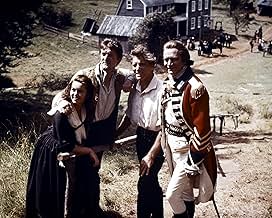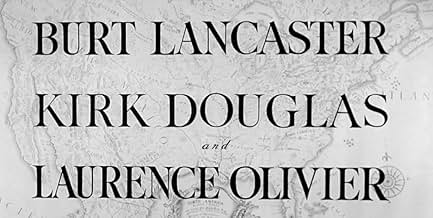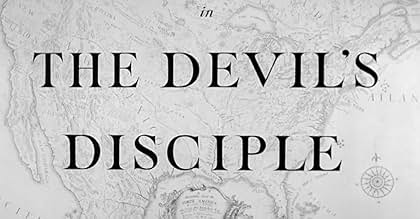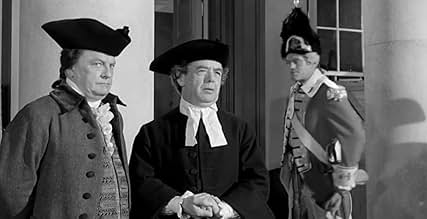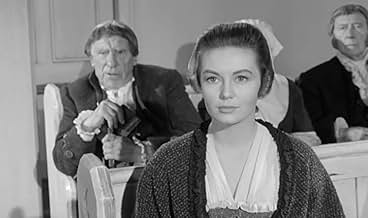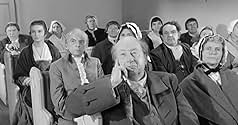CALIFICACIÓN DE IMDb
6.9/10
3.1 k
TU CALIFICACIÓN
La oveja negra de una familia y el ministro local descubren sus verdaderas vocaciones durante la Guerra de la Revolución.La oveja negra de una familia y el ministro local descubren sus verdaderas vocaciones durante la Guerra de la Revolución.La oveja negra de una familia y el ministro local descubren sus verdaderas vocaciones durante la Guerra de la Revolución.
- Dirección
- Guionistas
- Elenco
- Nominada a1 premio BAFTA
- 1 nominación en total
Neil McCallum
- Christie Dudgeon
- (as Neil Mc Callum)
Joe Beckett
- British Officer
- (sin créditos)
Steven Berkoff
- British Corporal
- (sin créditos)
- Dirección
- Guionistas
- Todo el elenco y el equipo
- Producción, taquilla y más en IMDbPro
Opiniones destacadas
Laurence Olivier is a British general surrounded by mediocrity and outnumbered by rebel forces who won't give him a fair fight. Burt Lancaster is a pacifist minister trying to protect his innocent parishioners, most of whom haven't yet taken any side in the Revolutionary War. Kirk Douglas is a bright-eyed ne'er-do-well, interested only in himself. Put three great actors like this together and you're bound to get great results, right?
Wrong. I completely fail to see how this movie can get such good reviews here. The first 50 minutes of the movie just barely avoid being downright awful. Olivier and Lancaster do next to nothing, while Douglas hams it up so bad that even the audience should feel embarrassed. Janette Scott, as Lancaster's wife, is forced to play a character with no discernible intelligence or personality whatsoever.
Have some patience, however, and you will eventually be rewarded. Lancaster and Douglas both experience sudden character changes. Lancaster gets a chance to be entertaining while Douglas' performance becomes excellent once he tones it down a bit. Allowed finally to interact with these two, Olivier becomes a valuable asset. The resulting 30 minutes is a high-spirited action adventure film with a light comedic touch and occasional witty dialogue. With the handicap of the terrible start, however, this is still nothing more than a pleasant but unremarkable diversion.
Wrong. I completely fail to see how this movie can get such good reviews here. The first 50 minutes of the movie just barely avoid being downright awful. Olivier and Lancaster do next to nothing, while Douglas hams it up so bad that even the audience should feel embarrassed. Janette Scott, as Lancaster's wife, is forced to play a character with no discernible intelligence or personality whatsoever.
Have some patience, however, and you will eventually be rewarded. Lancaster and Douglas both experience sudden character changes. Lancaster gets a chance to be entertaining while Douglas' performance becomes excellent once he tones it down a bit. Allowed finally to interact with these two, Olivier becomes a valuable asset. The resulting 30 minutes is a high-spirited action adventure film with a light comedic touch and occasional witty dialogue. With the handicap of the terrible start, however, this is still nothing more than a pleasant but unremarkable diversion.
Burt Lancaster and Kirk Douglas shared a chemistry -- offscreen as well as on screen -- which was rare even by Hollywood standards. There's a legend about them, as a matter of fact (and I'd hate to think it apocryphal), that -- at the onset of each of the many films in which they co-starred -- they flipped a coin to see who would play which role.
In their film adaptation of George Bernard Shaw's "The Devil's Disciple," the coin-flip would have been at best symbolic -- or perhaps ironic is the term here -- inasmuch as the plotline concerns role reversals and identity switching. Set during the closing days of the American revolution, Dick Dudgeon, the town rakehell (Douglas), having previously admitted to Reverend Anderson, the local minister (Lancaster), "Pastor, there's something about you I respect, and that makes me want you for my enemy," allows himself to be mistakenly arrested as that minister by British troops. It's an act which even he, at the time, is at a loss to explain. While Dudgeon keeps the local British commandant, General Burgoyne (Laurence Olivier in what turns out to be one of his finer screen performances), alternately amused and bemused, Reverend Anderson discovers within himself a call to action as he rallies the rebel troops to rescue Dudgeon and to cut off Burgoyne's reinforcements.
Purists may note that the film adaptation tampers with Shaw's more typically cynical resolution in the original stage presentation (yes, it is much more 'upbeat' and true to the Hollywood dicta of the day) . . . and yet the Shavian quality of the dialogue between Dudgeon and Anderson -- not to mention the barbed repartee between Dudgeon and Burgoyne -- is preserved virtually intact here. It is also brilliantly rendered by all parties.
Although Douglas manages to 'steal' much of this film, Lancaster affords us more than a glimpse of the ability which will, in little more than another year, garner him an Oscar -- for 'Elmer Gantry'-- (and put an end to the yearly ritual of his and Douglas' comedic "It's So Great Not To Be Nominated" performance at the awards ceremonies).
One of Hollywood's more successful adaptations of a stage play, this is also a film which, more than most, stands the test of time.
In their film adaptation of George Bernard Shaw's "The Devil's Disciple," the coin-flip would have been at best symbolic -- or perhaps ironic is the term here -- inasmuch as the plotline concerns role reversals and identity switching. Set during the closing days of the American revolution, Dick Dudgeon, the town rakehell (Douglas), having previously admitted to Reverend Anderson, the local minister (Lancaster), "Pastor, there's something about you I respect, and that makes me want you for my enemy," allows himself to be mistakenly arrested as that minister by British troops. It's an act which even he, at the time, is at a loss to explain. While Dudgeon keeps the local British commandant, General Burgoyne (Laurence Olivier in what turns out to be one of his finer screen performances), alternately amused and bemused, Reverend Anderson discovers within himself a call to action as he rallies the rebel troops to rescue Dudgeon and to cut off Burgoyne's reinforcements.
Purists may note that the film adaptation tampers with Shaw's more typically cynical resolution in the original stage presentation (yes, it is much more 'upbeat' and true to the Hollywood dicta of the day) . . . and yet the Shavian quality of the dialogue between Dudgeon and Anderson -- not to mention the barbed repartee between Dudgeon and Burgoyne -- is preserved virtually intact here. It is also brilliantly rendered by all parties.
Although Douglas manages to 'steal' much of this film, Lancaster affords us more than a glimpse of the ability which will, in little more than another year, garner him an Oscar -- for 'Elmer Gantry'-- (and put an end to the yearly ritual of his and Douglas' comedic "It's So Great Not To Be Nominated" performance at the awards ceremonies).
One of Hollywood's more successful adaptations of a stage play, this is also a film which, more than most, stands the test of time.
Kirk Douglas plays the title character with charm and panache, Lancaster delivers one of his best performances, and Olivier is an absolute delight in his smooth-as-silk portrayal of "Gentlemanly Johnny!" A pleasure to watch -- Bravo!
"The Devil's Disciple" is based on a play by George Bernard Shaw. It recalls of a page in the history of the American Revolution. The play and this film interject considerable humor and satire in otherwise serious matters of the time. All of the cast are good in their roles.
Burt Lancaster is the Rev. Anthony Anderson. Kirk Douglas is a rogue patriot, Richard Dudgeon. Laurence Olivier is the epitome of the arrogant and unbending British general, Burgoyne. Janette Scot plays Anthony's wife, Judith Anderson. She's a conflicted woman after she meets Dudgeon. She loves her husband but also falls for Dudgeon, in his adventurous ways. But two can play at that, as she find outs with Anthony at the end of the film. Harry Andrews flourishes in yet another of his fine British uniform portrayals.
The story takes place in the days of leading up to and the start of the American Revolution. Shaw's sarcasm and cynical treatment of some of the beliefs of the time underlie the story. The film isn't exceptional, but Lancaster's production company pulled together a stellar cast for this humorous look at history and poking fun through the pen of G.B. Shaw.
This is the third film that Lancaster and Douglas made together. Most movie buffs should find the film amusing.
Burt Lancaster is the Rev. Anthony Anderson. Kirk Douglas is a rogue patriot, Richard Dudgeon. Laurence Olivier is the epitome of the arrogant and unbending British general, Burgoyne. Janette Scot plays Anthony's wife, Judith Anderson. She's a conflicted woman after she meets Dudgeon. She loves her husband but also falls for Dudgeon, in his adventurous ways. But two can play at that, as she find outs with Anthony at the end of the film. Harry Andrews flourishes in yet another of his fine British uniform portrayals.
The story takes place in the days of leading up to and the start of the American Revolution. Shaw's sarcasm and cynical treatment of some of the beliefs of the time underlie the story. The film isn't exceptional, but Lancaster's production company pulled together a stellar cast for this humorous look at history and poking fun through the pen of G.B. Shaw.
This is the third film that Lancaster and Douglas made together. Most movie buffs should find the film amusing.
Having seen The Devil's Disciple on a venue that runs films which have fallen into the public domain, I wonder how anyone could have let copyright lapse on such an intriguing, yet quirky, film as this. With it's triumvirate of strong leading men, and an interesting script, this movie should be much more well known. And with it's rather oddball presentation it's surprising that it does not have cult status.
The live action segments are excellent, and there is no slack in the acting or direction. However, some poor soul made the bizarre decision to interject little Rankin-Bass type puppet animation segments at nearly random moments, thoroughly negating - each time - all the dramatic momentum that has been accumulated up to that point. The animated segments are well done, and moderately amusing in and of themselves, yet completely incongruous to the tone of the surrounding film.
These segments are, however, a minor flaw when compared with the greatest drawback of this movie. I am referring to the character of Judith Anderson, our hero's wife. She is, without a doubt, the most annoyingly fickle and foolish female character that I can recall having ever witnessed in any film; and very nearly the most hysterical as well. Not too far into the story I began to get the feeling that I would very much like to slap her. Halfway through the film I was consciously rooting for each of the male leads to take a turn slapping her. By the end of the film I was convinced that everyone in the film should have slapped her, and probably the crew as well! The only thing that made this character bearable was the calm, good-natured presence of Lancaster, Douglas, and Olivier.
Now, this is not intended to denigrate Miss Janette Scott, who portrayed Mrs. Anderson. On the contrary, she did a remarkable job of making this over-the-top hysterical woman seem real. A lesser actress might have easily come off as overly melodramatic and phony in such an extreme performance. Her skill in the performance is the reason that we want to slap her. Kudos to Janette Scott. It is my opinion that almost everyone who watches this film will, in fact, want to slap her. Be prepared.
The live action segments are excellent, and there is no slack in the acting or direction. However, some poor soul made the bizarre decision to interject little Rankin-Bass type puppet animation segments at nearly random moments, thoroughly negating - each time - all the dramatic momentum that has been accumulated up to that point. The animated segments are well done, and moderately amusing in and of themselves, yet completely incongruous to the tone of the surrounding film.
These segments are, however, a minor flaw when compared with the greatest drawback of this movie. I am referring to the character of Judith Anderson, our hero's wife. She is, without a doubt, the most annoyingly fickle and foolish female character that I can recall having ever witnessed in any film; and very nearly the most hysterical as well. Not too far into the story I began to get the feeling that I would very much like to slap her. Halfway through the film I was consciously rooting for each of the male leads to take a turn slapping her. By the end of the film I was convinced that everyone in the film should have slapped her, and probably the crew as well! The only thing that made this character bearable was the calm, good-natured presence of Lancaster, Douglas, and Olivier.
Now, this is not intended to denigrate Miss Janette Scott, who portrayed Mrs. Anderson. On the contrary, she did a remarkable job of making this over-the-top hysterical woman seem real. A lesser actress might have easily come off as overly melodramatic and phony in such an extreme performance. Her skill in the performance is the reason that we want to slap her. Kudos to Janette Scott. It is my opinion that almost everyone who watches this film will, in fact, want to slap her. Be prepared.
¿Sabías que…?
- TriviaThe character of The Reverend Anthony Anderson was loosely based on the historical figure of Peter Muhlenberg, known as the "Fighting Parson of the American Revolution".
- ErroresSeveral times while going through the forest, the British refer to "snipers." However, the term sniper didn't come into being until about 40 years after the American Revolutionary War. The term came into usage in 1824, while the war ended in 1783.
- Citas
Major Swindon: What will history say, sir?
General John Burgoyne: History, sir, will tell lies, as usual!
- Créditos curiososThe opening credits appear over a map of North America during the Revolutionary War, which then zooms into an animated battle played out by paper models.
- ConexionesReferenced in Esta rubia vale un millón (1960)
- Bandas sonorasYankee Doodle
(uncredited)
traditional 18th Century Anglo-American folk song
Heard under main title
Selecciones populares
Inicia sesión para calificar y agrega a la lista de videos para obtener recomendaciones personalizadas
- How long is The Devil's Disciple?Con tecnología de Alexa
Detalles
- Fecha de lanzamiento
- Países de origen
- Idioma
- También se conoce como
- The Devil's Disciple
- Locaciones de filmación
- Productoras
- Ver más créditos de la compañía en IMDbPro
Taquilla
- Presupuesto
- USD 1,500,000 (estimado)
- Tiempo de ejecución1 hora 23 minutos
- Color
- Relación de aspecto
- 1.85 : 1
Contribuir a esta página
Sugiere una edición o agrega el contenido que falta

Principales brechas de datos
By what name was El discípulo del diablo (1959) officially released in India in English?
Responda

